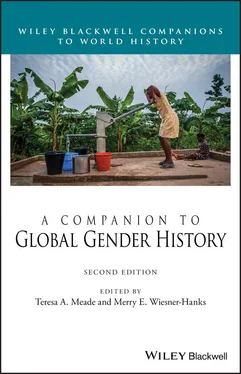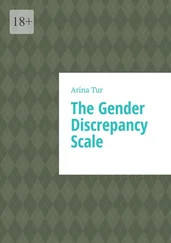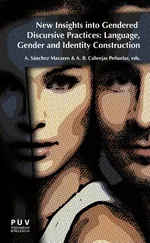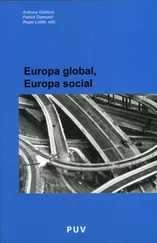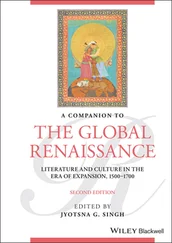Even states that eschewed monarchical rule for that of citizens, like republican Rome or “democratic” Athens, drew upon familial patriarchal models to organize political life. Romans understood their society to be a family and arranged their political and legal offices according to the principles of patria potestas , fatherly authority, so that magistrates, always male, behaved like paterfamilias and ruled in consultation with a council of other paterfamilias ; and citizens, always male, recognized themselves as unequal to one another, just as they would be within families depending upon their age or birth order and whether their father still lived. Women enjoyed no rights to citizenship and could not hold office, just as they lacked any legal authority over their children within families, even after their husbands had died (Lacey, 1986; Thomas, 1992). Women, Romans believed, did not possess the moral or mental capacity that would enable them to enjoy legal capacity, to look after the interests of anyone but themselves.
Women had no rights to citizenship in Athens, either, a situation explained and justified by Aristotle in terms that reverberated across the centuries right down to our own time. Aristotle’s political theory, the stories he told to legitimate the legal and political regime of his time, explicitly constructed the realm of politics as masculine (Brown, 1988). Politics, according to Aristotle, provided men – and it was only men and men of independent wealth, at that – the sole means by which they could achieve their full human potential; the polis, he insisted, was the “higher thing,” and the place where man, “by nature,” was “intended to live.” The “self‐sufficiency” demonstrated by men who headed households based on land, or oikos , enabled them to subordinate their private interests to the public good, to demonstrate the virtue required to act politically.
For Aristotle and countless others across the centuries, women had no political function, for they – like men who did not enjoy independence and who were classified, in political terms, as feminine – could not, by their nature, display the self‐sufficiency necessary to transcend personal concerns. Self‐sufficiency meant freedom from material necessity, especially of the necessities associated with the body. Women, for the Greeks, appeared to be all body, creatures in thrall to their physical organization who could not free themselves as men could and should strive to do in order to reach the highest good, the “good life” of politics. Politics, in other words, and the criteria of those who could participate in the polis, were explicitly cast in terms antithetical to femininity. Whereas women for the Greeks, and for many other cultures, too, demonstrated by their weakness of mind, lack of self‐control, appetites, and sexual desires an existence closer to animality than to humanness, men could show through freedom from material and bodily necessity their capacity to act politically. Because femininity seemed so close to animality in its apparent enslavement to bodily needs, and because humanity was defined by the Greeks in opposition to animality, femininity threatened men’s status as human beings, and their capacity for freedom and autonomy; it had to be suppressed. In consequence, the polis, where men could best demonstrate their self‐sufficiency, their virtue, and their distance from femininity, had to be an exclusively masculine realm. Aristotle’s thinking about politics and about the place of men and women in them was taken up by later Western political theorists with the recovery and rehabilitation of classical ancient thought during the Renaissance.
The Medieval and Early Modern Periods
During Europe’s medieval period, the centralized government and codified laws of the Roman and Carolingian empires gave way to smaller units of territorial power presided over by local chieftains and their armed retainers. In the absence of a single ruler who could dominate over others, and in the face of almost endemic warfare, local individual families came to serve as vital sources of stability. Under the feudal system characteristic of Europe between the ninth and thirteenth centuries, political power became fragmented and personal; it rested in the hands of that landed military ruler or lord who could command the loyalty of the warriors around him, the knights who pledged their homage, a term deriving from the French word for man, homme . “I will be your man,” they pledged their lords in return for prerogatives of wealth and behavior that set them apart from the vast majority of men and women of this period and constituted them as an aristocracy, explicitly betraying the masculine nature of the warrior societies that comprised feudal Europe. But despite the overwhelmingly male composition of the ruling duchies, principalities, and kingdoms that dotted the European countryside, the elite wives, sisters, and daughters of local rulers and knights found a great deal of scope within which they might exercise power and administer the law, mostly as the agents of their husbands, fathers, or brothers, but sometimes in their own right as well. As members of powerful families, they might enjoy power themselves.
Despite the existence of laws that prohibited women from holding political office, serving as commanders of armed men, presiding over manorial courts, or sitting on royal or municipal councils – all justified by earlier Roman beliefs that women lacked intelligence, were weak‐minded ( imbecilitas sexus ), wily, and avaricious – elite women did all of these things (Shahar, 1983). The power of feudal lords derived from their ownership of the source of wealth in their societies, land. To the extent that elite women owned land, as they did increasingly during and after the reign of Charlemagne in the ninth century CE, or in place of their husbands and fathers, who were often away from the manor engaging in military campaigns, women carried out the functions of law, taxation, justice, administration, and war that attended the possession of estates. Abbesses, presiding over church lands, ordered knights to fight in battles. Queens and noblewomen drew up law codes, like the Usages of Barcelona , one of the first written law codes to appear after the demise of the Carolingian empire. And between 1100 and 1600, at least thirty women had sovereign authority in Europe, not as regents for their underage sons or absent husbands or fathers (Monter, 2012).
The regularity with which women exercised power and their great visibility in medieval times excited much comment from disapproving males. The French conjured up an ancient piece of legislation, the Salic Law, which, they said, prohibited women from ruling as queens in their own right because they lacked, inherently as women, juridical authority. The monk Liutprand of Cremona, attributed the power of what he called the “pornocracy” of women to their shameful sexual proclivities and their corruption of men. How else explain that Ermengarde, Marquess of Ivrea, “held the chief authority in all Italy” except to aver that “the cause of her power, shameful though it may be even to mention it, was that she carried on carnal commerce with everyone, prince and commoner alike…. Ermengarde’s beauty, in this corruptible flesh, roused the fiercest jealousies among men: for she would give to some the favours she refused to others” (McNamara and Wemple, 1977)? His statement reflects the widespread and deep‐seated Christian understanding of women, drawn from the story of Adam and Eve, as especially carnal, lustful creatures responsible for Original Sin and man’s fall from grace, a depiction shared by and carried forward into political thought by one of the most significant theorists of his or anyone’s day, Niccolo Machiavelli.
Читать дальше
